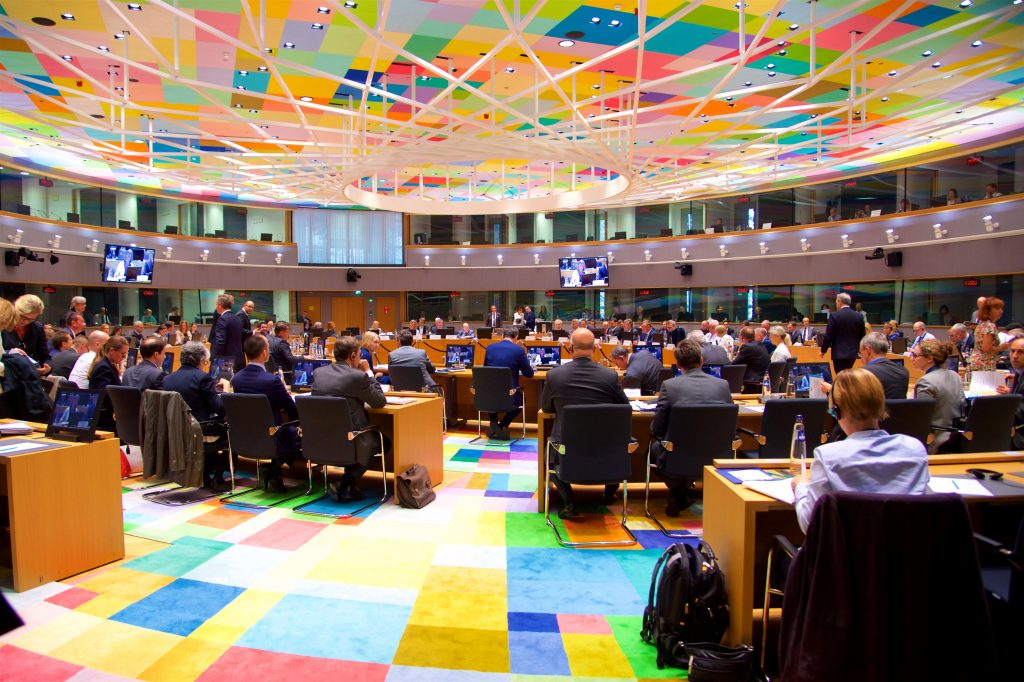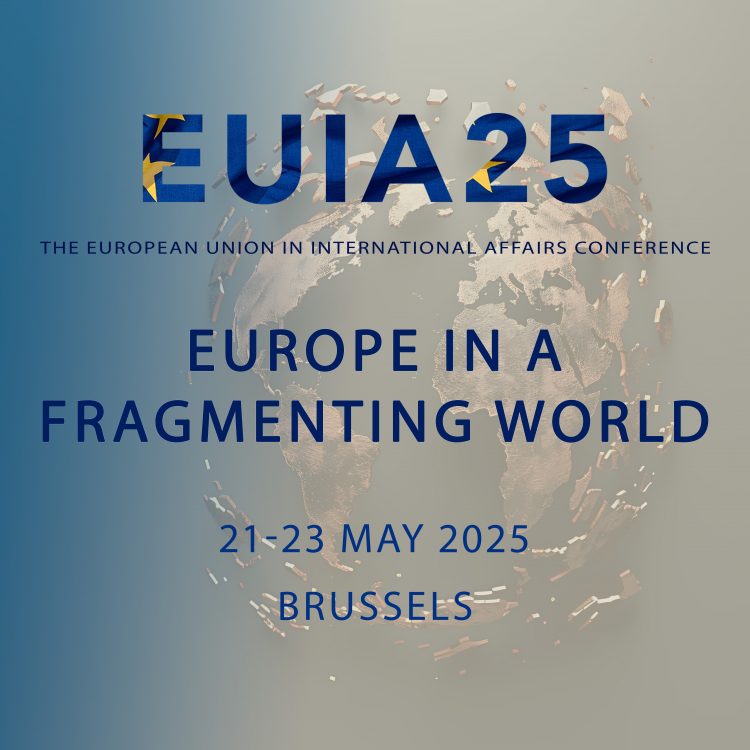 Ramona Coman is Professor in political science, President of the Institute for European Studies (IEE-ULB) and member of Cevipol (Centre d’études de la vie politique). She is the Coordinator of the Jean Monnet Module Rule of law and mutual trust in global and European governance (599377-EPP-1-2018-1-BE-EPPJMO-MODULE)
Ramona Coman is Professor in political science, President of the Institute for European Studies (IEE-ULB) and member of Cevipol (Centre d’études de la vie politique). She is the Coordinator of the Jean Monnet Module Rule of law and mutual trust in global and European governance (599377-EPP-1-2018-1-BE-EPPJMO-MODULE)
When the Treaties establishing the European Communities were signed in the 1950s, the political elites of the time were more concerned with peace and freedom in Europe, while democracy promotion was the purview and primary purpose of the Council of Europe. The democratic character of Member States only became an issue in 1962 when Franco’s Spain first asked to join the European communities. Although the founding treaties were silent on any specific enlargement criteria, the members of the Parliamentary Assembly insisted on the importance of democracy as a sine qua non condition for accession. Over the years, democratic requirements have been affirmed in many declarations[1], taken up more and more space on the pages of treaties, starting with the preambles and slowly being integrated in Article 2 TUE and Article 7 TUE, as well as in provisions for internal and external European Union policies in order to strengthen the political identity of the Union.
Over the last decades, transformations in Poland, Hungary and Romania have put the question of European values on the EU agenda. The changes made to the judicial systems in these countries have brought some researchers to believe that the EU is facing an existential crisis, with “far-reaching implications for the European project because without common values, there are fewer reasons for the EU to exist” (Pech and Scheppele 2017: 8).
From 2011 onwards the Hungarian government led by Viktor Orban (Fidesz) introduced extensive changes to the legal framework of the country. Two examples of this are the competences of the Hungarian Constitutional Court being limited as a result of the constitutional reform and a policy lowering the compulsory retirement of judges, prosecutors and notaries from 70 to 62 which resulted in the early retirement of 236 judges. Since then the situation in Hungary has further deteriorated as stated in the Report adopted by the European Parliament (Rapporteur Judith Sargentini) in September 2018, calling on the Council to trigger Article 7, which sanctions Member States which fail to comply with the values referred to in Article 2.
A similar path has been followed by the Polish government. From 2015 onwards the Law and Justice (PiS) party has argued that far-reaching changes to the judiciary are required to remove judges who served during the communist era. While the EP triggered article 7 against Hungary, on 20 December 2017 the Commission activated article 7 against Poland.
What has happened since then?
Critical observers would answer “nothing”. Since then, the Polish and Hungarian authorities have adopted other controversial measures, although both under Article 7.
The European Parliament (EP) has passed several resolutions and invited the Prime ministers of the Member States in question for debates; the Commission – under the presidency of José Manuel Barroso and Jean-Claude Juncker – created a series of new tools such as the Justice Scoreboard in 2013 and the Rule of Law Framework in 2014, the latter crafted as an ancillary instrument to the infringement procedures and article 7 TEU. As argued elsewhere, these tools, although criticised for their limits, have been attempts to strengthen the Commission’s legitimacy in dealing with rule of law issues (see Coman 2015, 2018), to objectify evaluations and be able to monitor the state of the rule of law in all EU Member States. This has been done! Nonetheless, the von der Leyen Commission has proposed a new toolbox (see COM 2019(343).
The Juncker Commission initiated the rule of law dialogue with Poland. Over the course of two years, more than 25 letters were exchanged between the Commission, represented by Vice-President Frans Timmermans and members of the Polish PiS Government. The Commission published one opinion and four recommendations on the rule of law. In light of the weak collaboration of the Polish government in the exchanges with the Commission, academics such as Blauberger and Kelemen, Kochenov and Bard as well as Kochenov and Pech have underscored that the instruments set up by the Commission – particularly the Rule of Law Framework – do not seem to be efficient in the face of a government determined to transform its judiciary. Other solutions have been put on the table such as the rule of law conditionality. This is another complex debate that I will not weigh in on here.
The Commission has been at the centre of the debates as well as the Parliament, with support and criticism.
Starting in March 2017, the Vice-president of the Commission, Frans Timmermans, asked repeatedly that the situation of the rule of law in Poland be examined by the Council.
The rotating presidencies of the Council have been reluctant to put these issues on the agenda of their meetings. When the topic was discussed it was not put under a specific item on the agenda, but under “any other business”.
Initially, many Member States considered that triggering article 7 would be counter-productive while others were impatient to see domestic legislation progress more quickly towards a framework that did not threaten the independence of the judiciary.
The representatives of France, Germany, and the Netherlands did not hesitate to make their positions public. Representatives for Spain, Ireland, and Slovakia wanted to remain “neutral” in this debate for reasons related to their domestic political situation. The Belgian Foreign Minister Didier Reynders played an active role putting on the agenda of the Council a proposal of a rule of peer review mechanism in all EU member states, with the support of German State Secretary Michael Roth.
As the Hungarian and Polish authorities implemented new measures in addition to the ones for which article 7 was triggered, the Council could no longer avoid the topic. Hearings have been organized.
The situation in Poland was discussed in February 2018 when France and Germany expressed their preoccupations in a joint statement (Agence Europe, 27 February 2018). In June 2018, the permanent representatives of the Member States to the EU (COREPER) agreed to an audition on 26 June 2018, in Luxemburg in the General affairs Council framework, the last step before a vote (Agence Europe 13 June 2018). During this unprecedented three-hour hearing in which each party had the opportunity to talk, thirteen States spoke. As it started late, it seems that the hearing took place in the absence of the Italian, German, and Austrian ministers while the next discussion was scheduled to take place during the Austrian presidency (July-December 2018) in September 2018.
In October 2018, the Council also took up the situation of the rule of law in Hungary. A debate was held towards the end of the Austrian presidency, on 12 November 2018, in Brussels, in which most of the discussions pertained to Hungary while the deliberation on Poland was over in a matter of minutes as no representative of a Member State chose to speak (Agence Europe, 3 November 2018). Another hearing on Poland took place in December 2018 in the framework of the General affairs Council. In neither case were the concerns alleviated.
When intergovernmentalism reaches its limits
Beside the situation in Poland and Hungary, the Council reviewed the evaluation of the rule of law dialogue it established in 2014. The annual rule of law dialogue was on the agenda of the General Affairs Council on 19 November 2019. A resolution was proposed to replace the current rule of law dialogue in the Council with a new one according to which the European Commission would produce an annual report on each EU member state. As commented by the Finnish Minister for European Affairs Tytti Tuppurainen, this annual dialogue should be seen above all as a way of “uniting” Member States on common values (Agence Europe 19/11/2019).
The negotiations on this matter advanced slowly as both Poland and Hungary opposed the proposal made by the Finish presidency (Agence Europe, 19/11/2019). Member States under the Article 7 procedure insisted that references to political traditions, national identities, and constitutional structures should be included in the evaluation of the annual dialogue on the rule of law. Hence, the proposal makes reference to a series of principles such as “objectivity, non-discrimination, and equal treatment of all Member States; a non-partisan and evidence-based approach” (Council of the European Union 14173/19).
Unsurprisingly the bone of contention remains. And the bone of contention seems to be the role of the Commission. Member States supporting the annual dialogue agree that it could make use of the Commission’s new annual rule of law reports. But the power of the Commission – which is gardienne des traités – has been repeatedly contested by the Hungarian and Polish authorities. According to Agence Europe, the Hungarian and Polish governments want to minimize the role of the Commission and its evaluations, and want their own assessments to be included in the overall evaluation (Agence Europe, 6/11/2019). Judith Varga, Hungarian Justice Minister, recently stated that the current toolbox “gives such a big power for the European Commission without any kind of treaty basis,” she said. “Too much political attention is around rule of law. Rule of law is a constitutional principle. It needs more legal attention and less political attention” she declared for FT. Varga stated that the Hungarian government does not support the idea of authorizing the Commission to carry out rule of law assessments. In other words, Hungary supports an intergovernmental dialogue which allows member states to provide their own assessments on the state of the rule of law (Hungary today). “Hungary would only allow to experts of member states to investigate its state of democracy, but not for EU specialists in Brussels” after the hearing in the LIBE committee in the European Parliament in September 2019”, she said (see Euronews, 17/09/2019).
In the absence of consensus, the text discussed by the General Affairs Council was supported, or not objected to, by 26 delegations (Source: Council of the EU).
The Council will hold a hearing on Article 7 proceedings against Hungary on 10 December 2019 under the Finish Presidency (Euractiv, 22 November 2019). Hungary expects to close discussions on Article 7.
Judit Varga, the Hungarian justice minister, told the Financial Times that the so-called Article 7 proceedings against Budapest were “absurd” and that a resolution of the case within months would be “timely”.
Is this another reflection of the classical tensions between supranational vs. intergovernmental integration?
My answer is no. This goes far beyond traditional debates and different visions for Europe. As Viktor Orban stated on many occasions, this is an attempt to dismantle liberal democracy, and with it some form of EU integration. “Liberal democracy has no future”, said Viktor Orban. He seeks to legitimize what he calls “illiberal democracy”, which is unquestionably something that does not exist. As many authors argue, one thing is clear: political regimes that refuse to promote human rights, the independence of the judiciary, the limitation of government power, and pluralism of opinion cannot be described as democracies, (see for example Yascha Mounck 2018).
The Hungarian and Polish authorities are not inclined to compromise.
The limits of intergovernmentalism have been reached; nonetheless, more intergovernmentalism seems to be the solution proposed by both Poland and Hungary while it is obvious that a turkey won’t vote for Christmas (metaphor borrowed from Grabbe 2014).
The Polish and Hungarian authorities have repeatedly argued that the ways in which judicial systems are organized is a sovereign competence of Member States. As recently stated by the Court of Justice the fact remains that, “when exercising that competence, the Member States are required to comply with their obligations under EU law” (Judgment in Case C-619/18 Commission v Poland). The role of national courts and tribunals in the application of EU law is crucial as they are the first ones responsible for it.
While waiting for the Council and European Council meetings in December, attention is directed to Luxembourg where judges shed light on this complex debate.
Strong disagreements in the Council are not unusual. However, the history of the integration process tells us that discussions and deliberations usually lead to conciliations, says Prof. Mario Telo. In the case under consideration and at this stage at least there is no realistic hope for compromise. Or the question is “which compromise”?
The text was previousy published by OpenEUDebate, a Jean Monnet Network that includes among its members the IEE-ULB




